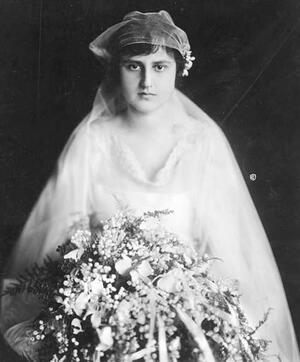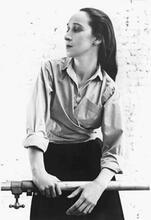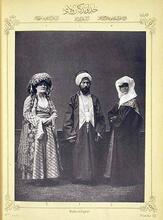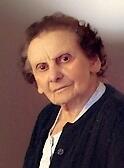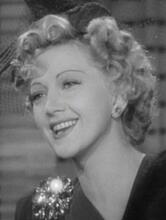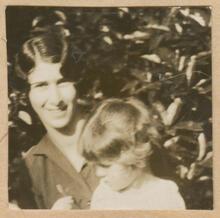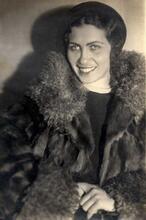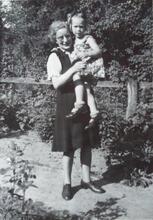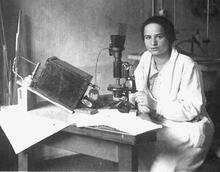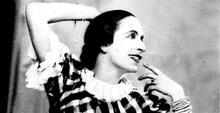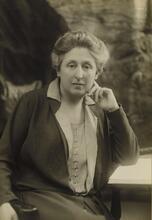Elinor Morgenthau
Elinor Morgenthau’s accomplishments were largely invisible, as she helped her husband, Henry Morgenthau, Jr., rise to great heights in Franklin Delano Roosevelt’s administration. Morgenthau graduated from Vassar College and then taught at the Henry Street Settlement, where she met and proposed to her husband. Elinor Morgenthau became speaker for the state Democratic Committee Women’s Division and in 1920 she and her husband began their association with the Roosevelts. She took classes in public speaking and used her sharp political instincts to help propel her husband to become Secretary of the Treasury. When he was unavailable for speaking engagements, she often filled in for him. She became Eleanor Roosevelt’s assistant in the Office of Civilian Defense, but soon suffered health problems that limited her work.
Elinor Morgenthau was an assimilationist German Jewish success story. Morgenthau achieved prominence by promoting the men around her and by camouflaging her Judaism. She was a product of her era and was adept at its political and social strategies.
Family and Marriage
Elinor (“Ellie” to her friends) Fatman Morgenthau was born in 1891 in New York City to a well-to-do family of German Jewish descent. Her father, Morris Fatman, was a clothing manufacturer, and her mother, Settie (Lehman) Fatman, was from the wealthy Lehman family of banking fame. Elinor had one older sister, Margaret. She attended Miss Jacobi’s private school for girls and was unusual for her time in continuing on to college. She enjoyed Vassar College, where she was a standout in theater. She was also athletic, participating enthusiastically in both tennis and horseback riding.
Following her graduation in 1913, she returned to Manhattan, where she taught acting at the Henry Street Settlement House. It was there that she met Henry Morgenthau, Jr., of the influential Morgenthau family. On February 22, 1916, she proposed to him in Central Park, and the couple was married on April 17, 1916. The ceremony was performed by Rabbi Stephen Wise.
The Morgenthaus studiously rejected all Jewish observance. They celebrated both Christmas and Easter, complete with a festive ham. They avoided Jewish social networks and vacation spots. They had three children: Henry III, who became a television producer; Robert, the district attorney for New York; and Joan, a physician. Their sons were not ritually circumcised, and they pointedly violated the Ashkenazi custom of not naming children for living relatives.
Political Career
The Morgenthaus split their time between New York City and their farm in Dutchess County. Elinor Morgenthau became the speaker for the state Democratic Committee Women’s Division. In 1920, she and her husband began their association with Eleanor and Franklin D. Roosevelt, campaigning for him in every election thereafter. The two women became close friends, and it was said that the Morgenthaus were the only Jews the Roosevelts knew socially.
Elinor Morgenthau was a master conversationalist with invaluable political instincts. She took lessons in public speaking and applied her talents toward promoting her husband’s career. Her ambition helped propel him to positions of power under Roosevelt, including his appointment as secretary of the treasury. When the family moved to Washington, D.C., she coached her husband in political nuances and operated as his fill-in when he was unavailable to speak. Her successful reading of the political climate enabled the Morgenthaus to straddle the rivalry between the Franklin and Eleanor Roosevelt camps. In 1941, Elinor Morgenthau became Eleanor Roosevelt’s assistant in the Office of Civilian Defense. However, in 1942, her activities were drastically curtailed due to health problems.
Later Life
Morgenthau’s involvement with Jewish affairs was consciously minimal. She never attended religious services. Nevertheless, she recognized the impact of the Holocaust when, in 1944, she accompanied Eleanor Roosevelt on a visit to the Oswego, New York, internment camp for displaced persons. Similarly, the Holocaust also affected Henry Morgenthau’s political activity. He drew closer to Jewish interests when he became head of the newly created War Refugee Board. Elinor Morgenthau supported her husband’s increasing Jewish involvement (after FDR’s death), including campaigning on behalf of the new State of Israel.
In 1945, the couple attended a A seven-day festival to commemorate the Exodus from Egypt (eight days outside Israel) beginning on the 15th day of the Hebrew month of Nissan. Also called the "Festival of Mazzot"; the "Festival of Spring"; Pesah.Passover Lit. "order." The regimen of rituals, songs and textual readings performed in a specific order on the first two nights (in Israel, on the first night) of Passover.seder for American servicemen, the Morgenthaus’ first observance of the ritual meal. Whether this thawing of relations with the Jewish world would have continued can only be guessed. Following a heart attack in 1945, Elinor Morgenthau suffered a stroke and died in New York on September 21, 1949. A master of political maneuvering whose time forced her into the shadow of her husband, Elinor Morgenthau came to her Jewishness only late in life.
AJYB 52:503.
Morgenthau, Elinor. Records, RG 171. Office of Civilian Defense, National Archives, Washington, D.C., and Oral History Transcripts. Library of Congress.
Morgenthau, Henry, III. Mostly Morgenthaus: A Family History (1991).
National Encyclopedia of American Biography (1950), s.v. “Morgenthau, Henry, Jr.”.
Who’s Who in America (1946), s.v. “Morgenthau, Henry, Jr.”

